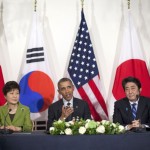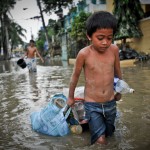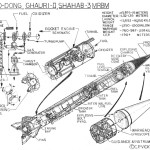- DETERRENCE: The Folly of Nuclear Armament
- DPRK: Park Calls for Resolving N.K. Nuclear Issue as First Step Toward Building Nuclear-Free World
- ENERGY SECURITY: Symposium on a New Type of Major Power Relationship
- GOVERNANCE AND CIVIL SOCIETY: President Park Suggests Global Pilot Project to Denuclearize North Korea
- CLIMATE CHANGE ADAPTATION: Towards a Resilient Future: Children and Disasters, Special Issue No. 104, All India Disaster Mitigation Institute
- CLIMATE CHANGE AND SECURITY: Climate and Security: Evidence, Emerging Risks, and a New Agenda
 DETERRENCE: The Folly of Nuclear Armament, Moon Chung-in, JoongAng Ilbo, March 10, Page 35, March 11, 2014
DETERRENCE: The Folly of Nuclear Armament, Moon Chung-in, JoongAng Ilbo, March 10, Page 35, March 11, 2014
Santoro argues that Japanese and ROK (J&ROK) independent nuclear forces will rupture US alliances and fatally damage US leadership. Colby argues that the US cannot block such proliferation, and nuclear armed J&ROK would help deter China. Moon argues that Santoro overstates J&ROK ability to proliferate; and ROK has better options than nuclear weapons.
- Will America’s Asian Allies Go Nuclear? David Santoro, The National Interest, January 30, 2014
- Choose Geopolitics Over Nonproliferation, Elbridge Colby, The National Interest, February 28, 2014
DPRK: Park Calls for Resolving N.K. Nuclear Issue as First Step Toward Building Nuclear-Free World, Global Post. (24 March 2014)
North Korea continues to exhibit some frustration and internal tensions as demonstrated by simultaneously reaching out and lashing out. Missile firings indicate lashing out, especially when conducted immediately after China’s Six Party lead visited China and in the context of U.S., ROK and Japan leaders meeting as well as South Korean President Park calling for a nuclear-free world. However, North Korea is also meeting with Japan (a perceived enemy) on Chinese soil (a country about which North Koreans have complex feelings)
- Seoul: NKorea fires 2 ballistic missiles. Choi Jung-yoon and Foster Klug, Associated Press (25 March 2014)
- INSIGHT: N. Korea under pressure to address abduction issue in talks with Japan. Takuya Suzuki, Koichiro Ishida and Kim Soon-hi, The Asahi Shimbun. (21 March 2014)
- US, S Korea to launch massive drill next week, PressTVIR (Iran). (20 March 2014)
 GOVERNANCE AND CIVIL SOCIETY: President Park Suggests Global Pilot Project to Denuclearize North Korea, Arirang News (24 March 2014)
GOVERNANCE AND CIVIL SOCIETY: President Park Suggests Global Pilot Project to Denuclearize North Korea, Arirang News (24 March 2014)
ROK President Park suggested that the international community launch a pilot project to denuclearize the Korean peninsula, warning that the Yongbyon facility risks a disaster on a scale greater than Chernobyl. The leaders of Japan and ROK also held their first meeting since taking office, in a trilateral summit with the US. Japan is pursuing a diplomatic breakthrough with the DPRK as well, expecting to hold their first formal talks in over a year.
- Park warns of possible nuclear disaster in NK, Kim Tae-gyu, Korea Times (24 March 2014)
- Obama brokers Japan, South Korea talks as Pyongyang fires missiles, Thomas Escritt and Linda Sieg, Reuters (26 March 2014)
- Japan and North Korea said to agree to formal talks, Martin Fackler, New York Times (20 March 2014)
 CLIMATE CHANGE ADAPTATION: Towards a Resilient Future: Children and Disasters, Special Issue No. 104, All India Disaster Mitigation Institute, Ahmadabad, India (2014) [1.01 MB, PDF]
CLIMATE CHANGE ADAPTATION: Towards a Resilient Future: Children and Disasters, Special Issue No. 104, All India Disaster Mitigation Institute, Ahmadabad, India (2014) [1.01 MB, PDF]
Despite the vulnerability of the children to climate change, it has been shown that with adequate support and protection, children can also be extraordinarily resilient in the face of stresses and shocks. There is ample documentation, moreover, of the benefits of having older children active, informed and involved in responding to the challenges in their lives, not only for their own learning and development, but for the energy, resourcefulness and knowledge that they can bring to local issues.
- Children and Disasters: Understanding Impact and Enabling Agency, Fran Seballos et al., Institute of Development Studies – IDS (2011)
- Climate Change and Urban Children: Impacts and Implications for Adaptation in Low- and Middle-income Countries, Sheridan Bartlett, International Institute for Environment and Development – IIED (684 KB, PDF)
 ENERGY SECURITY: Symposium on a New Type of Major Power Relationship, James Hansen (24 February 2014)
ENERGY SECURITY: Symposium on a New Type of Major Power Relationship, James Hansen (24 February 2014)
For James Hansen, the threat of mass extermination is at hand. He has graphs of area under water in Beijing/Tianjin and Shanghai/Nanjing regions, and a carbon budget. Without Lord Stern’s mumbo jumbo, he argues for rising internal carbon fees and technology cooperation between the US and China, to finance converter and fast breeder reactors, and carbon capture and storage. Other technologies and business plans may also postpone the doomsday, though.
- Simbol Materials’ lithium extraction could help Salton Sea, K. Kaufmann, The Desert Sun (22 February 2014)
- In search of new sales, defense contractors embrace energy market, Marjorie Censer, Washington Post Capital Business (3 March 2014)
- Google Energy? Amazon Power?, Nick Butler, Financial Times blog (24 February 2014)
 CLIMATE CHANGE AND SECURITY: Climate and Security: Evidence, Emerging Risks, and a New Agenda, François Gemenne, Jon Barnett, W. Neil Adger, and Geoffrey D. Dabelko, Climatic Change (March 2014), Volume 123, Issue 1, pp 1-9.
CLIMATE CHANGE AND SECURITY: Climate and Security: Evidence, Emerging Risks, and a New Agenda, François Gemenne, Jon Barnett, W. Neil Adger, and Geoffrey D. Dabelko, Climatic Change (March 2014), Volume 123, Issue 1, pp 1-9.
The IPCC Fifth Assessment Report will reflect a more mature approach to climate-security links than most recent work, incorporating complexity in causation, the role of power, historically unprecedented conditions, and maladaptation. Yet the picture is more complex still: impacts of methane from melting Siberian permafrost alone have been compared to the size of the global economy. Far beyond the Arctic, even just this will radically change security calculations.
- Why a melting Arctic could sink the global economy, Cathleen Kelly, Center for American Progress (19 March 2014)
- Vast costs of Arctic change, Gail Whiteman, Chris Hope and Peter Wadhams, Nature 499, 401–403 (25 July 2013)
- Global campaign to combat climate change has become too complex to manage, study suggests, Insurance Net (16 March 2014)
The Nautilus Peace and Security Weekly Report presents articles and full length reports each week in six categories: Austral security, nuclear deterrence, energy security, climate change and security, the DPRK, climate change adaptation and governance and civil society. Our team of contributors carefully select items that highlight the links between these themes and the three regions in which our offices are found—North America, Northeast Asia, and the Austral-Asia region.
- Subscribe to NAPSNet to receive free weekly email reportsEditor
Contributors:
- Deterrence: Peter Hayes
- Governance and Civil Society: Dyana Mardon
- Climate Change Adaptation: Saleem Janjua
- DPRK: Roger Cavazos
- Austral Peace and Security: Richard Tanter


